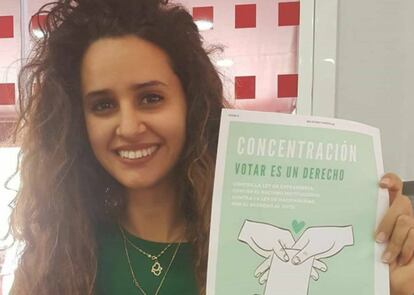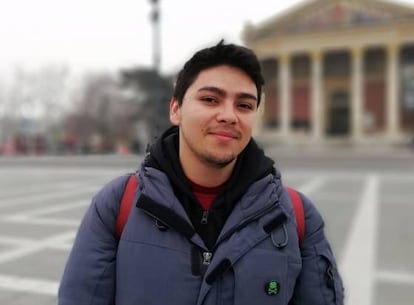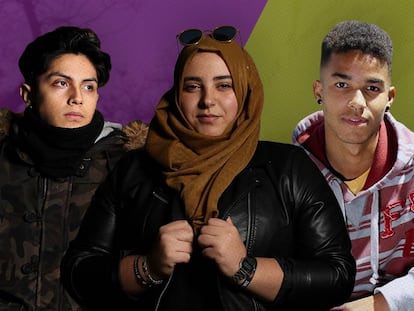Born in Spain but unable to vote: The red tape faced by children of immigrants
Over 500,000 people cannot vote at the upcoming general election even though they have lived in the country all their lives

Safia El Aaddam was born in the northeastern Spanish city of Tarragona. Although the 23-year-old is politically active, she cannot vote in the general election on April 28, or in the European, regional and municipal elections on May 26. ¡°I¡¯ve lived here for years and fulfilled my duties, but I do not have the same rights,¡± she complains.
Although Safia was born in Spain, she does not have Spanish citizenship, which is an essential requirement to vote in elections. According to the civil code, in order to be granted citizenship it is not enough to be born in Spanish territory ¨C one parent must have citizenship, or both parents must be stateless or unknown, all of which does not apply to Safia. In legal terms, unlike some other countries, Spain operates on the basis of jus sanguinis (Latin for right of blood), rather than jus soli (Latin for right of the soil).
I¡¯ve lived here for years and fulfilled my duties, but do not have the same rights Safia El Aaddam, 23
According to data from the National Institute of Statistics (INE) collected in the 2018 Immigration Report by the Barcelona Center for International Affairs (CIDOB), 520,000 people in Spain do not have Spanish citizenship even though they were born in the country.
Safia began the process to become a Spanish citizenship when she was 18, after she saw her friends going to vote when she couldn¡¯t. But the right to vote is only one of the reasons why she wants Spanish citizenship. With it, Safia would have the same rights as EU citizens, be able to study on the Erasmus exchange program, and take civil servant examinations.
Even though Sofia meets the requirements needed to apply for ¡°nationality by residence,¡± which in her case are one year of residency, showing good conduct and a sufficient degree of integration, she still has not yet received it. And she isn¡¯t alone. In 2017, 400,000 people were stuck in limbo waiting to obtain citizenship, according to data from the Ministry of Defense and the Spanish ombudsman.
In 2015, online registration was introduced to speed up the application process, but it has not had the desired effect. The process still takes years, and many believe that the backlog is the result of a lack of political initiative, not just technical issues,
CAMPA?A contra el #racismoinstitucional
— Hijadeinmigrantes (@SafiaElaaddam) April 1, 2019
Me presento. Soy @hijadeinmigrantes , nac¨ª en Espa?a hace 23 a?os, estoy acabando una carrera y s¨¦ que cuando acabe no podr¨¦ opositar. Trabajo, pago MIS impuestos pero no puedo #votar en el que es mi pa¨ªs.
Abro hilo pic.twitter.com/0cggoWcAqm
CAMPAIGN against #instituitionalracism. Let me introduce myself. I am @hijadeinmigrantes, I was born in Spain 23 years ago, I am finishing a degree and I know that when it's over I won't be able to sit the civil servant exam. I work, I pay MY taxes but I cannot #vote in what is my country.
What¡¯s more, applicants have to pass two exams to be granted Spanish citizenship by residence ¨C one is a Spanish language test and the other is on the Spanish Constitution and culture. It costs €200 to sit the exams, which were introduced in 2015. Because Safia studied in Spain, she is waiting for this requirement to be waived, a measure which was proposed in a draft ministerial order in 2016.
520,000 people in Spain who do not have Spanish citizenship despite having been born in the country
According to the CIDOB¡¯s 2018 immigration report, 6.2 million foreigners (13.3% of the total population) live in Spain. This number includes 2.1 million people who have Spanish citizenship but were born elsewhere, over four million who were born outside of Spain and do not have Spanish citizenship, and 520,000 people, who like Safia, were born in Spain but lack citizenship.
Only people with Spanish citizenship can vote in the elections, although there are exceptions. EU citizens, for instance, can vote in municipal and European elections, and can also be elected as mayors and local councilors. Foreigners from 12 different countries can also vote in municipal elections in Spain if they are the registered on the municipal roll and can show they have lived in the country uninterruptedly for five years. These special agreements, signed in 2011, apply to people from Bolivia, Cabo Verde, Chile, Colombia, South Korea, Ecuador, Iceland, Norway, New Zealand, Paraguay, Peru, and Trinidad and Tobago.

In order to vote in the municipal election on May 26, EU nationals and citizens of the 12 countries covered by the special agreements have to register in the Electoral Census for Foreign Residents in Spain (CERE). It is a process that must be done ahead of time. Jorge Hincapi¨¦ from Colombia did not register in time for the 2011 election, but he was one of the 464,074 migrants who voted in the 2015 municipal election. The?27-year-old came to Spain when he was eight and began the process to apply for Spanish citizenship last year so that he can sit civil servant exams in the future.
#IGiveYouMyVote
¡°You made me invisible since I was born but I¡¯ve been screaming since I¡¯ve had a voice. You¡¯re not going to shut me up,¡± Safia wrote in a message on Twitter.
Safia applied for Spanish citizenship five years ago but has still not received it
Fueled by frustration, Safia decided to launch votaresunderecho.es (voting is a right), an initiative that aims to connect people who cannot vote because of their administrative situation with others who can vote but don¡¯t want to. Three hundred voters and 500 vote-hunters have already signed up.
The idea for the project, which is being promoted on social media with the hashtag #TeCedoMiVoto, or #IGiveYouMyVote, came from Elisabet Alarc¨®n, Safia¡¯s 21-year-old friend from Barcelona, who offered to vote on behalf of Safia. ¡°I abstain from voting because I see the inequality which makes it difficult for those who have emigrated to participate,¡± says Alarc¨®n.
The process is simple. Users go to the website, check whether they want to vote or donate their vote, then fill out the details of where they live, the election they want to take part in and their reasons why (this part is optional). Come election day, the two people meet to vote. ¡°It¡¯s a stopgap measure but at least the people born here feel that our voice will reach the polls,¡± says Safia.
According to the Migrant Integration Policy Index (MIPEX), a study which analyzes integration policies in Europe and other countries, political participation is one of the weakest areas of the integration process. Allowing foreigners to vote could be a powerful tool to help migrants feel like they belong.
English version by Asia London Palomba.
Tu suscripci¨®n se est¨¢ usando en otro dispositivo
?Quieres a?adir otro usuario a tu suscripci¨®n?
Si contin¨²as leyendo en este dispositivo, no se podr¨¢ leer en el otro.
FlechaTu suscripci¨®n se est¨¢ usando en otro dispositivo y solo puedes acceder a EL PA?S desde un dispositivo a la vez.
Si quieres compartir tu cuenta, cambia tu suscripci¨®n a la modalidad Premium, as¨ª podr¨¢s a?adir otro usuario. Cada uno acceder¨¢ con su propia cuenta de email, lo que os permitir¨¢ personalizar vuestra experiencia en EL PA?S.
En el caso de no saber qui¨¦n est¨¢ usando tu cuenta, te recomendamos cambiar tu contrase?a aqu¨ª.
Si decides continuar compartiendo tu cuenta, este mensaje se mostrar¨¢ en tu dispositivo y en el de la otra persona que est¨¢ usando tu cuenta de forma indefinida, afectando a tu experiencia de lectura. Puedes consultar aqu¨ª los t¨¦rminos y condiciones de la suscripci¨®n digital.









































